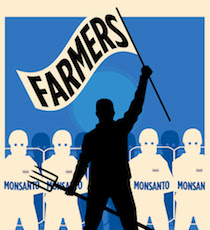Peru has officially passed a law banning genetically modified ingredients anywhere within the country for the next ten years.
In a massive blow to multinational agribiz corporations such as Monsanto, Bayer, and Dow, Peru has officially passed a law banning genetically modified ingredients anywhere within the country for a full decade before coming up for another review.
Peru’s Plenary Session of the Congress made the decision 3 years after the decree was written despite previous governmental pushes for GM legalization due largely to the pressure from farmers that together form the Parque de la Papa in Cusco, a farming community of 6,000 people that represent six communities.
They worry the introduction of genetically modified organisms (GMOs) will compromise the native species of Peru, such as the giant white corn, purple corn and, of course, the famous species of Peruvian potatoes. Anibal Huerta, President of Peru’s Agrarian Commission, said the ban was needed to prevent the ”danger that can arise from the use of biotechnology.”
While the ban will curb the planting and importation of GMOs in the country, a test conducted by the Peruvian Association of Consumers and Users (ASPEC) at the time of the ban’s implementation found that 77 percent of supermarket products tested contained GM contaminants.
”Research by ASPEC confirms something that Peruvians knew all along: GM foods are on the shelves of our markets and wineries, and consumers buy them and take them into their homes to eat without knowing it. Nobody tells us, no one says anything, which involves a clear violation of our right to information,” Cáceres told Gestión. GMOs are so prevalent in the Americas that it is virtually impossible to truly and completely block them, whether through pollination or being sneaked in as processed foods.
“There is an increasing consensus among consumers that they want safe, local, organic fresh food and that they want the environment and wildlife to be protected,” wrote Walter Pengue from the University of Buenos Aires in Argentina, in a recent statement concerning GMOs in South America. “South American countries must proceed with a broader evaluation of their original agricultural policies and practices using the precautionary principle.”
Peru’s Plenary Session of the Congress made the decision 3 years after the decree was written despite previous governmental pushes for GM legalization due largely to the pressure from farmers that together form the Parque de la Papa in Cusco, a farming community of 6,000 people that represent six communities.
They worry the introduction of genetically modified organisms (GMOs) will compromise the native species of Peru, such as the giant white corn, purple corn and, of course, the famous species of Peruvian potatoes. Anibal Huerta, President of Peru’s Agrarian Commission, said the ban was needed to prevent the ”danger that can arise from the use of biotechnology.”
While the ban will curb the planting and importation of GMOs in the country, a test conducted by the Peruvian Association of Consumers and Users (ASPEC) at the time of the ban’s implementation found that 77 percent of supermarket products tested contained GM contaminants.
”Research by ASPEC confirms something that Peruvians knew all along: GM foods are on the shelves of our markets and wineries, and consumers buy them and take them into their homes to eat without knowing it. Nobody tells us, no one says anything, which involves a clear violation of our right to information,” Cáceres told Gestión. GMOs are so prevalent in the Americas that it is virtually impossible to truly and completely block them, whether through pollination or being sneaked in as processed foods.
“There is an increasing consensus among consumers that they want safe, local, organic fresh food and that they want the environment and wildlife to be protected,” wrote Walter Pengue from the University of Buenos Aires in Argentina, in a recent statement concerning GMOs in South America. “South American countries must proceed with a broader evaluation of their original agricultural policies and practices using the precautionary principle.”
Note: This decree was signed into effect on April 15th 2011. I guess agribiz corporations didn't want it widely known!










